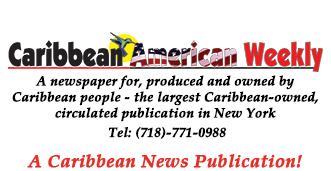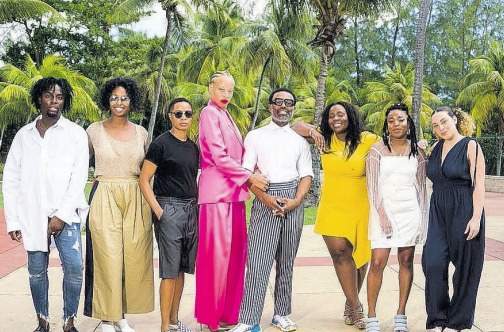Presenters at the International Fashion Festival in Bridgetown, Barbabos (from left) Ronny Oppong — global retail relations director at Liberty Fashion and Lifestyle Fairs; Luam Keflezghi, international buyer of ready-to-wear fashion; Danielle A Cooper, fashion influencer and blogger; Stacey McKenzie, fashion model and runway coach; Ouigi Theodore, founder of the Brooklyn Circus, a retro-urban fashion boutique and label; Sharifa Murdock — co-founder/owner of Liberty Fairs and founder of Envsn Festival; Channing Hargrove, fashion writer for Refinery 29; and Hillary Joseph, director of Cabana Swim and consultant for Fashion Brazil.
Last month, fashion influencers, bloggers, runway coach and international buyers gathered for the week-long eFashion is Big Business Workshop as part of the International Fashion Festival in Bridgetown, Barbados.
The workshop, which was facilitated by the Caribbean Market Centre, featured open discussions with international fashion designers, buyers and industry experts, and covered areas from creating designs to marketing products and creating a sustainable business model.
Ouigi Theodore, founder of the Brooklyn Circus — a retro-urban fashion boutique and label — encouraged the designers to take advantage of the Caribbean’s unique style, and in doing so market the designs to the region’s diaspora. He was among seven other professionals from the fashion industry that presented during the week of fashion events.
Theodore, a Haitian who moved to Brooklyn, New York when he was eight, charged that designers must first understand their culture to recognize the strength of the Caribbean identity in the diaspora.
In insisting that designers look to secure more Caribbean nationals living overseas, Theodore pointed to the success of reggae and hip hop in the black community.
“You have to know what you do best and continue to do it best with the little you do have. I am a huge advocate of reggae music and hip hop. They are about digging into their culture and representing… reggae is on the radio outside of Jamaica.”
“There is a Haitian middle class who is not living in Haiti. I’m a representative of that Haitian middle class. What Haitian rapper Wyclef Jean and guys of that generation did was to make it okay and cool to wave the Haitian flag. It is the same for you guys as Bajans. Rihanna has made it okay for you guys to wave the Bajan flag and say I am from Barbados and I am proud to be Barbadian. But that is not enough; you need to be on the ground, go back and forth, bridge the gap and push your designs,” he told the designers.
In echoing Theodore’s sentiments, Sharifa Murdock co-founder and owner of Liberty Fairs and founder of Envsn Festival, urged the designers to be the first to represent their brand as well as include simple-wear clothing in each line of designs.
“If you have a clothing line, you have to be your first buyer and lead by example. Believe in your dream and your product,” she said, adding it was critical for designers to also create simple products that could maintain cash flow.
“What a lot of designers put on runway is not what they put in the stores, because you have to find something people can wear. If you have a couture line, do something simple like T-shirts that is an easy sell. All you have to do is produce things that can give people a memorable moment of your brand,” Murdock advised.
She added that designers must be authentic in their designs and should look to create a reputable brand in their communities before looking to the United States.
“You guys are from the islands and no one takes the opportunity to really produce products for here. Everyone wants to go to the States but you have a big community here… and there is so much tourism,” Murdock continued.
Hillary Joseph — director of Cabaña Swim, a consultant on Fashion for Brazil and a swimwear buyer for Nads Swim also told designers that it is critical to know the product that their brand sits next to.
“Everyone wants to be in a Barneys or Saks Fifth Avenue, but that might not necessarily be where your brand needs to be. So it’s really being realistic and knowing what is right for your brand. It’s knowing who your brand sits next to based on your set-up and your price point, and then understanding what store that is,” she said.
The week-long event also featured presentations from Ronny Oppong, a Global Retail Relations Director at Liberty Fashion and Lifestyle Fairs; Channing Hargrove, fashion writer for Refinery 29 and owner of the blog Channing In the City; Luam Keflezghi, international buyer of ready-to-wear fashion; Danielle A. Cooper, Fashion influencer and blogger; and Stacey McKenzie, fashion model and runway coach.
The Caribbean Export Development Agency (Caribbean Export) supported the participation of regional designers at the workshop with funding from the European Union via the 11th EDF Regional Private Sector Development Programme.

